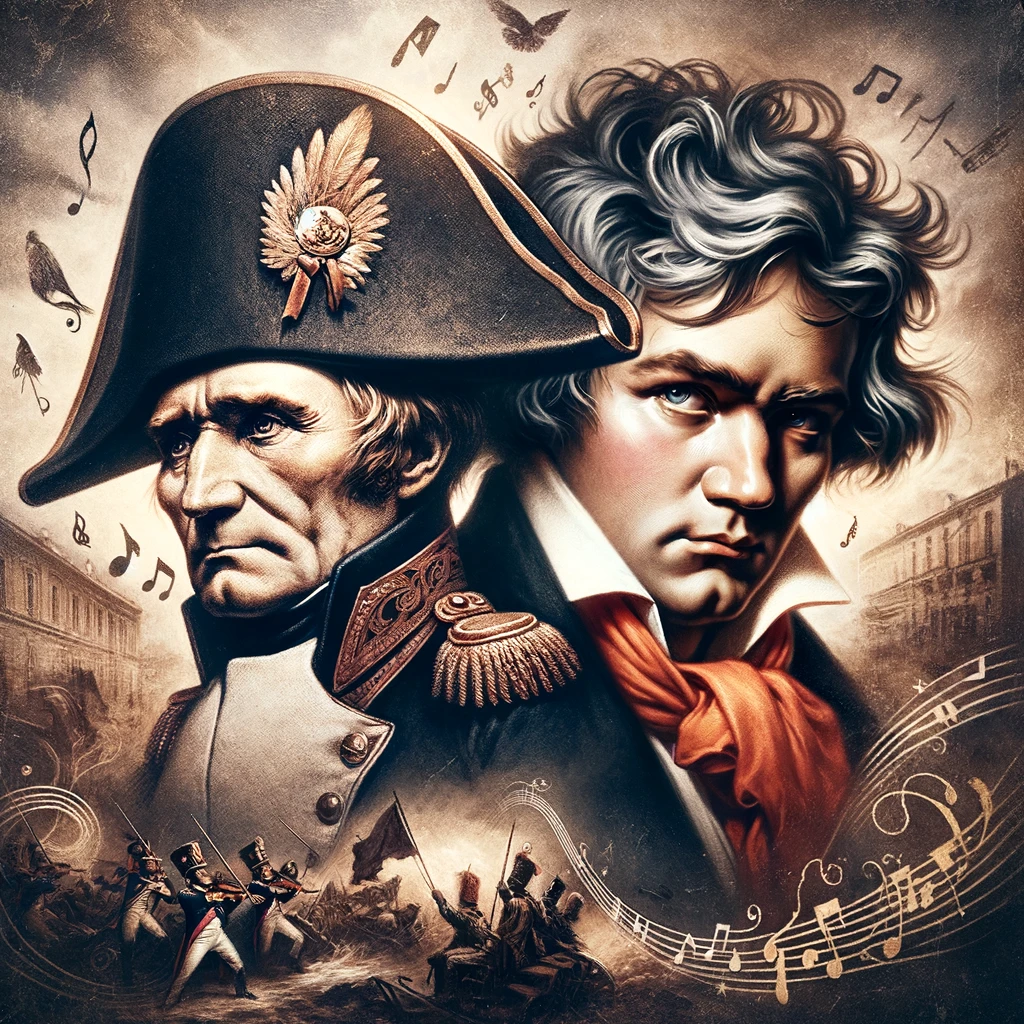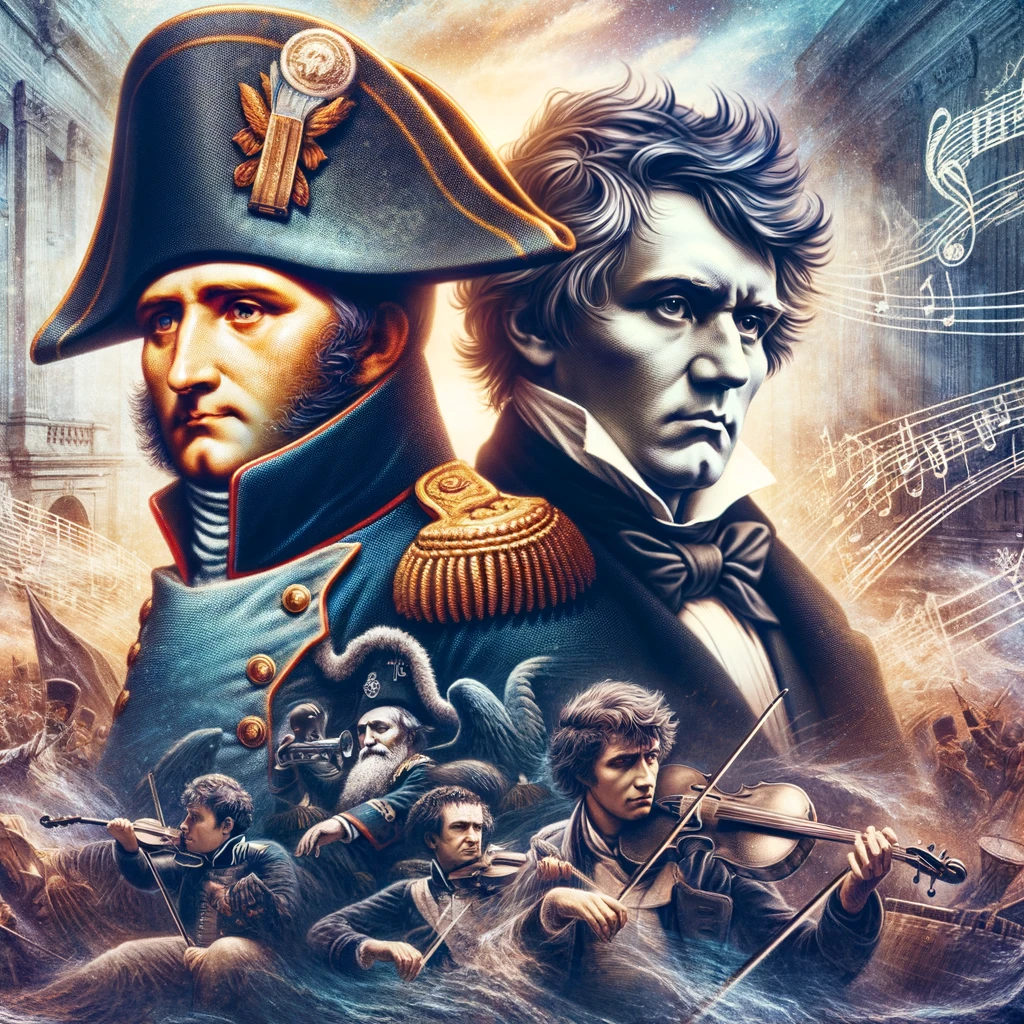
Exploring Beethoven’s Political Passion and Napoleon Link
Ludwig van Beethoven, a name synonymous with musical genius, was much more than a composer of timeless symphonies. His life and works were deeply intertwined with the political landscapes of his time, most notably his complex relationship with one of history’s most famous figures, Napoleon Bonaparte. This article explores how politics, passion, and personal struggles influenced Beethoven’s compositions, particularly his perception of and interactions with Napoleon.
Early Life and Rise to Fame
Born in 1770 in Bonn, Germany, Beethoven showed extraordinary musical talent from a young age. Initially taught by his father, Johann, a singer in the Electorate of Cologne’s court chapel, Beethoven’s prodigious skill soon surpassed the lessons of local teachers. His first public performance at the age of seven left audiences astounded.
In his early years, Beethoven was exposed to the ideals of the Enlightenment. He admired the works of Johann Wolfgang von Goethe and Friedrich Schiller, whose ideas about freedom and the rights of the individual deeply resonated with him. This ideological backdrop was crucial for understanding Beethoven’s later political views and his initial admiration for Napoleon.
Beethoven moved to Vienna in 1792, where he studied under Joseph Haydn. Vienna was a hub of artistic innovation, and it was here that Beethoven’s style began to mature and gain recognition. His compositions were not just technically brilliant; they were emotionally profound, reflecting his own experiences and inner turmoil.
Napoleon Bonaparte: The Hero and the Tyrant
Napoleon Bonaparte, a figure who reshaped Europe with his revolutionary ideas and military might, was initially seen by Beethoven as a liberator, a hero who embodied Enlightenment ideals. Beethoven’s third symphony, the Eroica, was originally dedicated to Napoleon in 1804, reflecting his admiration.
However, Beethoven’s perception of Napoleon drastically changed when Napoleon declared himself Emperor in 1804. Viewing this act as a betrayal of the democratic and anti-monarchical principles of the French Revolution, Beethoven famously tore off the dedication page of the Eroica. The symphony was then renamed “Sinfonia Eroica, composed to celebrate the memory of a great man,” signifying a complex turn in Beethoven’s view of heroism and power.
This incident illustrates the depth of Beethoven’s political convictions and how closely his art was tied to his personal beliefs. It was not just about music; it was a statement of his political and moral stance.
Personal Struggles and Musical Genius
Beethoven’s personal life was marked by significant struggles that deeply influenced his work. Perhaps the most profound was his deteriorating hearing, which began in his late twenties. By the time of the Eroica’s composition, Beethoven was already dealing with significant hearing loss, a devastating fate for a musician.
His hearing loss did not diminish his ability to compose, but it did change him. It led to social isolation, depression, and a deepening introspective quality in his music. Works like the famous “Moonlight Sonata” and later symphonies reflect a profound emotional depth, possibly born from his struggles.
The “Heiligenstadt Testament,” a letter written by Beethoven to his brothers in 1802, reveals his despair and resilience. He wrote of his hearing loss, “I would have ended my life—it was only my art that held me back.” This statement underscores the deep connection between his personal suffering and his artistic output.
Beethoven’s Political Views in Later Works
Despite his personal challenges, Beethoven remained politically engaged. His opera “Fidelio,” for instance, is a powerful statement on freedom, justice, and the triumph of personal integrity over tyranny. It reflects his continued commitment to the ideals of freedom and justice, even in the face of personal and political disappointment.
Beethoven’s Ninth Symphony, with its famous “Ode to Joy,” is another testament to his political and philosophical beliefs. Premiered in 1824, it was a groundbreaking work that included choral sections in a symphony—a bold move that reflected his innovative spirit. The symphony’s message of unity and brotherhood was a fitting culmination of his artistic and political vision.

Beethoven and the Spirit of Revolution
Beethoven’s era was one of turmoil and transformation. The French Revolution had upended traditional European structures, and the Napoleonic Wars were reshaping the continent. Beethoven, living through these tumultuous times, was not an observer but a participant through his music. His compositions often reflected the spirit of revolution and change.
The “Eroica” symphony, with its initial dedication to Napoleon, was not just a personal statement but also a reflection of the zeitgeist. The symphony’s dramatic structure, breaking away from traditional forms, symbolized a break from the past. It embodied the revolutionary spirit, challenging norms and setting new artistic standards.
The Vienna Years: A Crucible of Creativity
Vienna during Beethoven’s time was a city of contrasts, where artistic freedom coexisted with political repression. After Napoleon’s defeat, the Congress of Vienna in 1815 established a conservative order in Europe. Beethoven, amidst this, continued to compose works that pushed boundaries.
This period saw the creation of some of his most celebrated works, including the late string quartets and the “Choral” Symphony. These compositions were not only technical feats but also statements of emotional and intellectual depth. They reflected Beethoven’s internal struggle and his response to an increasingly repressive environment.
The Role of Patronage and Independence
Understanding Beethoven’s career also requires examining the role of patronage in his life. Unlike many of his predecessors who were dependent on aristocratic or church patronage, Beethoven enjoyed a degree of independence. This independence was partly due to the changing nature of music as a profession but also due to his own temperament and reputation.
His relationships with various patrons were complex. While he relied on their support, he also sought to maintain his artistic independence. This balance allowed him to compose works that were true to his vision, without the need to please any particular patron. This independence was crucial in allowing him to express his political and personal convictions through music.
Beethoven’s Enduring Legacy
The legacy of Beethoven goes beyond his compositions. He redefined the role of the composer in society and the potential of music to convey profound ideas and emotions. His willingness to infuse his music with his personal and political beliefs paved the way for future generations of composers to do the same.
Beethoven’s impact is also evident in how his music continues to inspire and resonate with people across different cultures and times. His works are celebrated not just for their musical brilliance but also for their human depth. They speak to universal themes of struggle, resilience, and the quest for freedom.
Conclusion
Ludwig van Beethoven’s journey from a musical prodigy to a composer intertwined with the political currents of his time, especially his complex relationship with Napoleon Bonaparte, paints a picture of a man deeply connected to the world around him. His rise to fame was marked by not just his undeniable talent but also his unyielding spirit in the face of personal and political challenges.
Beethoven’s music transcended the notes on the page; it was a reflection of his inner world and the turbulent times he lived in. The connection between his personal struggles, notably his hearing loss, and his political convictions, particularly his disillusionment with Napoleon, added layers of depth to his compositions.
In the end, Beethoven’s life and works remain a powerful illustration of the interplay between the personal and the political, the individual and society. His legacy is not just in the notes he left behind but in the spirit of his music, which continues to inspire and move audiences around the world. Beethoven, through his struggles and triumphs, reminds us of the enduring power of human creativity to reflect, challenge, and transform the world.